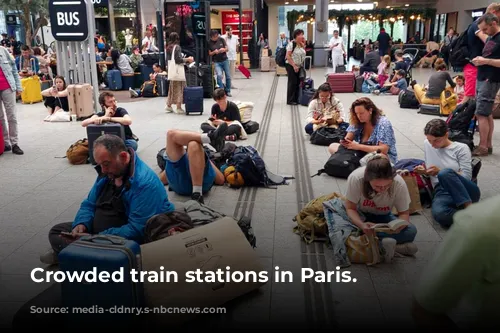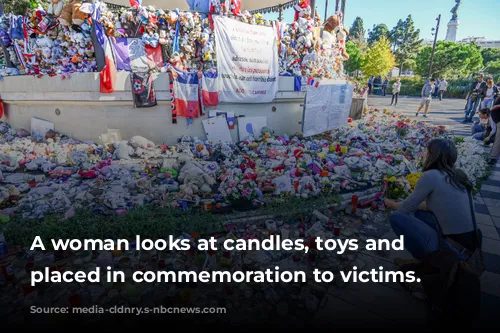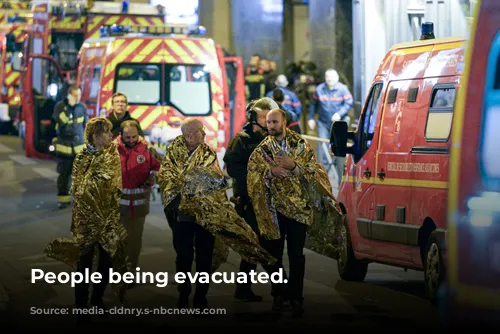The opening ceremony of the 2024 Olympic Games in Paris is just around the corner, but a chilling incident has cast a shadow over the festivities. Suspected anarchists carried out a coordinated arson attack on France’s high-speed rail system hours before the Games were set to begin, highlighting the significant security threats facing French law enforcement.
This brazen act of sabotage is just the tip of the iceberg. French authorities are grappling with a multitude of potential threats, each with its own unique set of challenges.

A Multifaceted Threat: From Anarchists to Terrorists
The potential threats to the Games are wide-ranging and complex, encompassing a chilling mix of extremist ideologies and state-sponsored actors.
According to multiple law enforcement officials from France, Europe, and the United States, the potential threats include:
- A Russian-backed sabotage campaign: This could involve acts of disruption, disinformation, or even violence aimed at undermining the Games and showcasing Russia’s power on the world stage.
- Attacks directed or inspired by terrorist groups based in the Middle East: Organizations like ISIS have a history of carrying out attacks in France, and their presence remains a concern for security officials.
- Cyberattacks: The Games’ reliance on internet-connected systems makes them vulnerable to disruptions that could impact everything from ticket sales to athlete information and critical infrastructure.
French officials have not yet confirmed a motive or the involvement of a foreign government in the rail attack. However, the incident underscores the need for heightened vigilance and a comprehensive approach to security.

Recent Arrests and a History of Violence
The arson attack on the rail system is not an isolated incident. French authorities have been working tirelessly to thwart potential attacks in the lead-up to the Games.
- In the days leading up to the Games, French authorities apprehended a 40-year-old Russian man suspected of plotting to destabilize the event. Authorities found evidence suggesting he was planning disruptive actions.
- In a separate incident, an 18-year-old was arrested for alleged links to a terrorist organization. Authorities are scrutinizing his electronic devices to determine his role in any potential threats.
The arrests come amidst a concerning rise in terrorism and violence in France, even outside the context of the Olympics.
- In recent weeks, France has witnessed a string of violent incidents, including the stabbing of a police officer, the ramming of a car into a café, and a suspected terrorist attack on a taxi driver.
These incidents are a grim reminder of the persistent threat of terrorism and the importance of maintaining a strong security posture.

Cybersecurity Threats and Russian Involvement
Cybersecurity experts warn that the Games’ dependence on digital infrastructure makes them an attractive target for both lone-wolf hackers and state-backed actors.
- Chris Krebs, former director of the Cybersecurity and Infrastructure Security Agency, predicts that Russian cyber actors will attempt to disrupt the Games. He cites a history of Russian cyberattacks, including the use of malware to disrupt the 2018 Olympics.
- Krebs highlights the Kremlin’s motivation for these attacks: They want to undermine Western support for Ukraine and demonstrate Russia’s influence on the global stage.
Russia is not only focused on cyberattacks, but is also engaging in physical sabotage across Europe.
- French authorities recently arrested a dual Ukrainian-Russian citizen who was allegedly attempting to carry out a pro-Russian act of sabotage against a French facility supporting Ukraine’s war efforts.
- The incident exemplifies the broader trend of Russian sabotage aimed at damaging infrastructure and supplies crucial to Ukraine’s defense.
These threats pose a significant challenge to French security forces, requiring a coordinated and multifaceted response.

Lessons Learned from Past Attacks
The recent security concerns have raised questions about whether French law enforcement has learned lessons from past attacks.
- Following the deadly attacks in Paris in 2015 and 2016, a review of French intelligence and law enforcement efforts revealed significant gaps and failures.
- Documents obtained by NBC News in 2016 showed that one suspect involved in the attacks was identified in 2009, but French authorities failed to deploy undercover informants to gather evidence.
In the wake of these criticisms, French authorities have implemented reforms to enhance their capabilities.
- The use of undercover informants has become more prevalent, as evidenced by the recent arrests of individuals suspected of plotting attacks.
French authorities have also prioritized the needs of victims, learning from the inadequate response to the Bataclan attack.
- Organizations like France Victimes have played a vital role in supporting victims and their families in the aftermath of attacks.
The Paris Olympics represent a significant opportunity to demonstrate the effectiveness of these reforms and the resilience of France in the face of adversity.

Conclusion
The 2024 Paris Olympics are set to be a celebration of sport and international cooperation. However, they are also a target for a wide range of threats, from anarchists to terrorists and cybercriminals. French authorities are facing a formidable challenge in ensuring the safety and security of the Games, but they have learned valuable lessons from past attacks and are deploying a range of measures to address these threats. The success of their efforts will not only determine the safety of the Games but also demonstrate France’s resolve in the face of a complex and evolving threat landscape.









